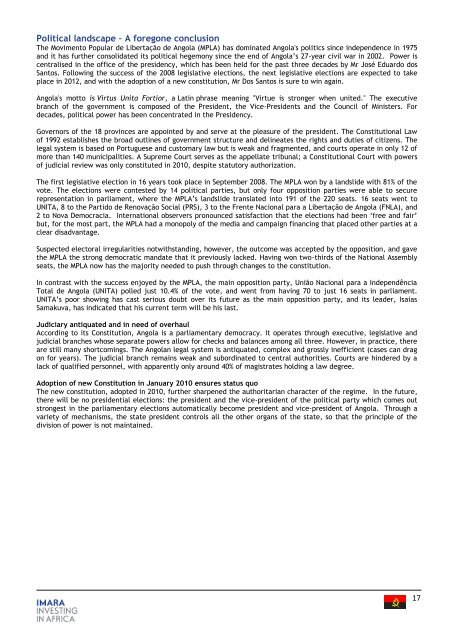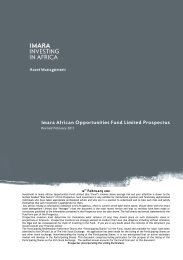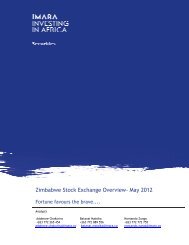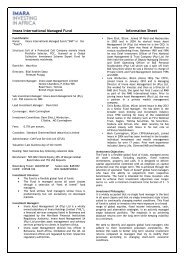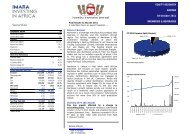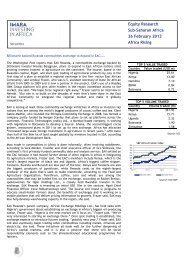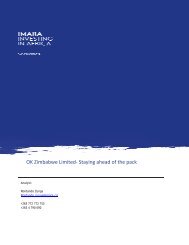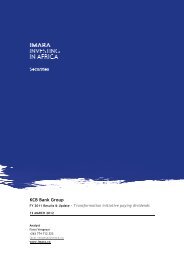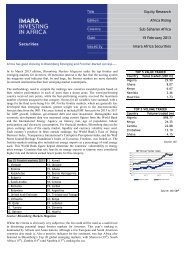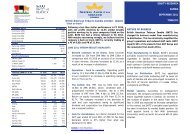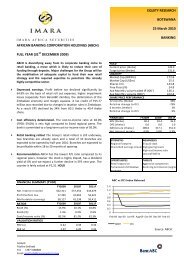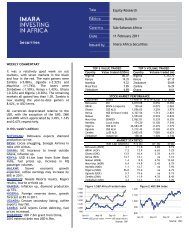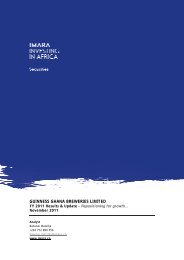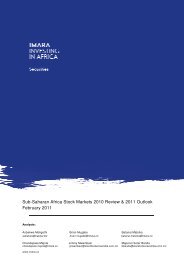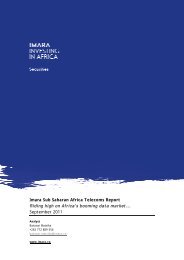Imara African Cement Report Africa, the last cement frontier Angola ...
Imara African Cement Report Africa, the last cement frontier Angola ...
Imara African Cement Report Africa, the last cement frontier Angola ...
Create successful ePaper yourself
Turn your PDF publications into a flip-book with our unique Google optimized e-Paper software.
Political landscape – A foregone conclusion<br />
The Movimento Popular de Libertação de <strong>Angola</strong> (MPLA) has dominated <strong>Angola</strong>'s politics since independence in 1975<br />
and it has fur<strong>the</strong>r consolidated its political hegemony since <strong>the</strong> end of <strong>Angola</strong>‟s 27-year civil war in 2002. Power is<br />
centralised in <strong>the</strong> office of <strong>the</strong> presidency, which has been held for <strong>the</strong> past three decades by Mr José Eduardo dos<br />
Santos. Following <strong>the</strong> success of <strong>the</strong> 2008 legislative elections, <strong>the</strong> next legislative elections are expected to take<br />
place in 2012, and with <strong>the</strong> adoption of a new constitution, Mr Dos Santos is sure to win again.<br />
<strong>Angola</strong>'s motto is Virtus Unita Fortior, a Latin phrase meaning "Virtue is stronger when united." The executive<br />
branch of <strong>the</strong> government is composed of <strong>the</strong> President, <strong>the</strong> Vice-Presidents and <strong>the</strong> Council of Ministers. For<br />
decades, political power has been concentrated in <strong>the</strong> Presidency.<br />
Governors of <strong>the</strong> 18 provinces are appointed by and serve at <strong>the</strong> pleasure of <strong>the</strong> president. The Constitutional Law<br />
of 1992 establishes <strong>the</strong> broad outlines of government structure and delineates <strong>the</strong> rights and duties of citizens. The<br />
legal system is based on Portuguese and customary law but is weak and fragmented, and courts operate in only 12 of<br />
more than 140 municipalities. A Supreme Court serves as <strong>the</strong> appellate tribunal; a Constitutional Court with powers<br />
of judicial review was only constituted in 2010, despite statutory authorization.<br />
The first legislative election in 16 years took place in September 2008. The MPLA won by a landslide with 81% of <strong>the</strong><br />
vote. The elections were contested by 14 political parties, but only four opposition parties were able to secure<br />
representation in parliament, where <strong>the</strong> MPLA‟s landslide translated into 191 of <strong>the</strong> 220 seats. 16 seats went to<br />
UNITA, 8 to <strong>the</strong> Partido de Renovação Social (PRS), 3 to <strong>the</strong> Frente Nacional para a Libertação de <strong>Angola</strong> (FNLA), and<br />
2 to Nova Democracia. International observers pronounced satisfaction that <strong>the</strong> elections had been „free and fair‟<br />
but, for <strong>the</strong> most part, <strong>the</strong> MPLA had a monopoly of <strong>the</strong> media and campaign financing that placed o<strong>the</strong>r parties at a<br />
clear disadvantage.<br />
Suspected electoral irregularities notwithstanding, however, <strong>the</strong> outcome was accepted by <strong>the</strong> opposition, and gave<br />
<strong>the</strong> MPLA <strong>the</strong> strong democratic mandate that it previously lacked. Having won two-thirds of <strong>the</strong> National Assembly<br />
seats, <strong>the</strong> MPLA now has <strong>the</strong> majority needed to push through changes to <strong>the</strong> constitution.<br />
In contrast with <strong>the</strong> success enjoyed by <strong>the</strong> MPLA, <strong>the</strong> main opposition party, União Nacional para a Independência<br />
Total de <strong>Angola</strong> (UNITA) polled just 10.4% of <strong>the</strong> vote, and went from having 70 to just 16 seats in parliament.<br />
UNITA‟s poor showing has cast serious doubt over its future as <strong>the</strong> main opposition party, and its leader, Isaias<br />
Samakuva, has indicated that his current term will be his <strong>last</strong>.<br />
Judiciary antiquated and in need of overhaul<br />
According to its Constitution, <strong>Angola</strong> is a parliamentary democracy. It operates through executive, legislative and<br />
judicial branches whose separate powers allow for checks and balances among all three. However, in practice, <strong>the</strong>re<br />
are still many shortcomings. The <strong>Angola</strong>n legal system is antiquated, complex and grossly inefficient (cases can drag<br />
on for years). The judicial branch remains weak and subordinated to central authorities. Courts are hindered by a<br />
lack of qualified personnel, with apparently only around 40% of magistrates holding a law degree.<br />
Adoption of new Constitution in January 2010 ensures status quo<br />
The new constitution, adopted in 2010, fur<strong>the</strong>r sharpened <strong>the</strong> authoritarian character of <strong>the</strong> regime. In <strong>the</strong> future,<br />
<strong>the</strong>re will be no presidential elections: <strong>the</strong> president and <strong>the</strong> vice-president of <strong>the</strong> political party which comes out<br />
strongest in <strong>the</strong> parliamentary elections automatically become president and vice-president of <strong>Angola</strong>. Through a<br />
variety of mechanisms, <strong>the</strong> state president controls all <strong>the</strong> o<strong>the</strong>r organs of <strong>the</strong> state, so that <strong>the</strong> principle of <strong>the</strong><br />
division of power is not maintained.<br />
17


